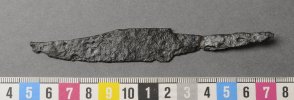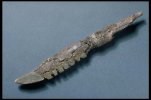I wonder if it's possible to learn when the term clip point appeared, and if it was in English or borrowed from another language ?
Does anyone have an OED ? Oxford English Dictionary? This will give some clues to etymology.
There are many words in use here, which are specific to traditional knife collectors, and not in wider use, sometimes not even by cutlers. It would be interesting to know if the term 'slipjoint' is in the OED for example

I spent about two years trying to find the name for a certain old blade form, which Charlie later used on his Ancient Barlow. I never really found a definitive answer, and the best I could find was 'Short Beak'. However, that blade, like many other blade forms, was also sometimes referred to simply as 'clipped'. The term 'clip point', I suspect, is much more recent. It may have been coined by a single manufacturer or cutler, or by a factor or marketing man, on either side of the Atlantic. Finding out when the term was first used, where, and by whom, would be a huge task, and you may never find a definitive answer. If you want to give it a shot, I'd suggest starting by looking at old cutlery catalogues, and books and articles published long ago, which look at the cutler's craft

As far as I recall, and I've read the book I referred to earlier several times, while Simon Moore refers to clipped blades on a number of occasions, he does not explain the etymology of the phrase. I suspect that is because its meaning is simple and obvious, and if there were some romantic - and accurate - tale to attach, I dare say he'd recount it. He does discuss a number of other knife myths. As with many things, it seems that the primary reason that different features and designs appear, disappear, and reappear throughout history, much like platform shoes, frilled shirts, or flared trousers, is not function, but simple fashion. For example, prior to the French revolution, French cutlery design was the overwhelming influence among English cutlers. What changed things was not a decline in the skills of French cutlers, but conflict between Britain and France making French designs unfashionable.
Many of the supposed "experts" at auction houses are full of what comes from the back end of a male cow. Anything to romanticize an object for sale in order to drive up the price is a basic part of their vocabulary.
Yes, there are ignorant people who make up silly stories like this, and then there are those who spread them for reasons of profit!

Yes, there are some really terrible definitions out there. I recall reading somewhere that the word "tractor" was derived from "actor" as meaning "someone who performed well in his field" or some such rubbish.

This sort of nonsense is endless unfortunately, people spread them without really giving them much thought. They've always existed, but the internet has certainly made things worse. Unfortunately, many respected authors are not immune to repeating myths, and to passing off guesswork or wishful thinking as fact

Yes in the age of mass communication downright misinformation can potentially take root, tenaciously so

The fact that he's an alleged expert on Arms & Armour ought to be an alert, pocket knives with Clip blades hardly constitute arms or armour...nor do fixed blades with Clips either. Think daggers/swords for the main, Scimitars excluded (which certainly free-date Clipper ships

massively) But then, is he a marine expert too....

Nobody really agrees why the word Clipper was used about a certain type of fast sailing ship. Clip meaning fast or clip suggesting time cut off journeys etc. Perhaps the blade should be re-named 'Windjammer' ?

It can be very hard to shake off Will

Look at how frequently Wikipedia is cited as an authority. It is certainly not the worst source by any means, and we all go there, but anyone can contribute to Wikipedia or edit pages there, I've done it myself. Once something is written down, most people take it as absolute fact. We also live in an age when people expect fast and easy answers. Look at how frequently someone posts a vague description of Granddad's knife here, and expects to be told the exact year it was made, and by whom

Sometimes that's possible, but it's only very rarely possible with Sheffield knives, yet auction houses and antique dealers will tell you any amount of nonsense, and even some people who should know better, are swayed by the way they appear so confident in their assessment. Just like the expert here, a nice romantic, convenient story, which will probably still be doing the rounds decades from now, however unlikely it is in reality.
Does this mean the
term is American?
Is it really essentially just slang we have taken to be a bona fide word or term?
I'm a curious knife nut

What are your thoughts
 Jack Black
Jack Black
?
Is it an American term?
All these things are possibilities my friend, see my post above

PresterJohn, I wish I could give you two thumbs up just for owning a copy of the OED.
I would guess that the answer is at the bottom of this entry. The term 'clip' may indicate the blow delivered by a sharpened swedge on the back cut.
Those are my two cents anyway.
That example from the OED may be unintentionally misleading in terms of our discussion. The term 'clip', as in 'a clip round the ear', is still in common use here in England, but it refers to a light blow, against a person or object

"Sheepfoot" is probably there. Will look later.
Edit: This is all I could find under "sheep's foot":
I guess the OED contributors were not knife people.
All these terms are in common use here on The Porch, but we're a small corner of the English-speaking world, and I think there is a requirement to show wider usage before words are accepted into the OED. Otherwise it'd be even bigger!

I am always fascinated to see the relatively small number of words accepted for inclusion each year, and those which are eventually jettisoned

I shall now head back to my couch


which, of course was bastardized over time, to become the commonly used vulgarity.



















